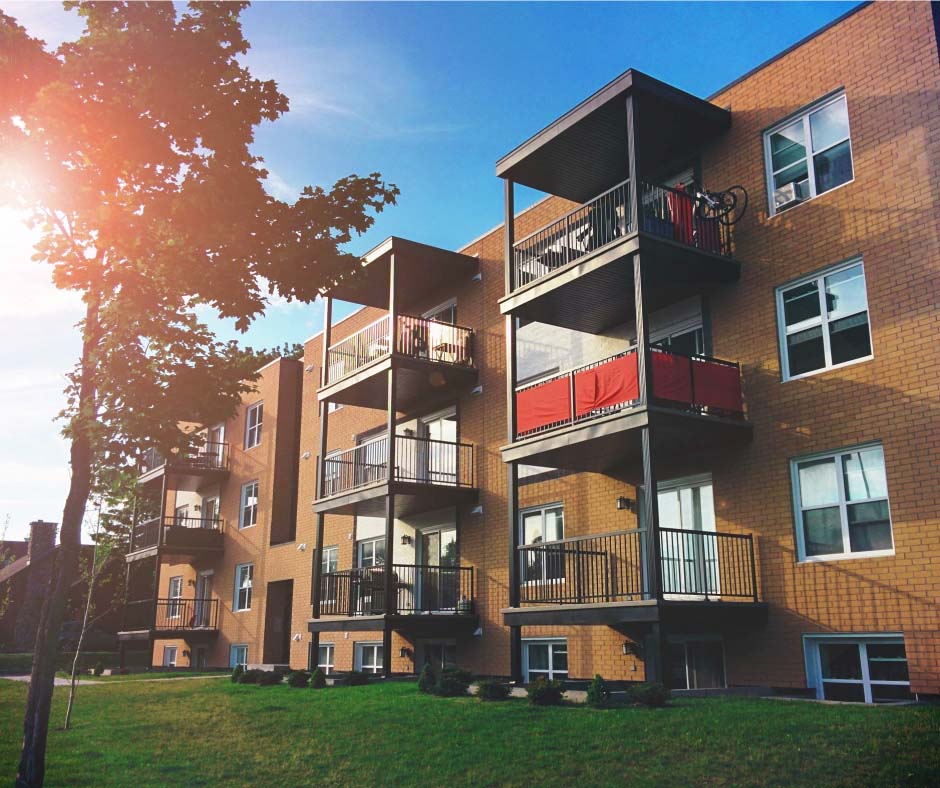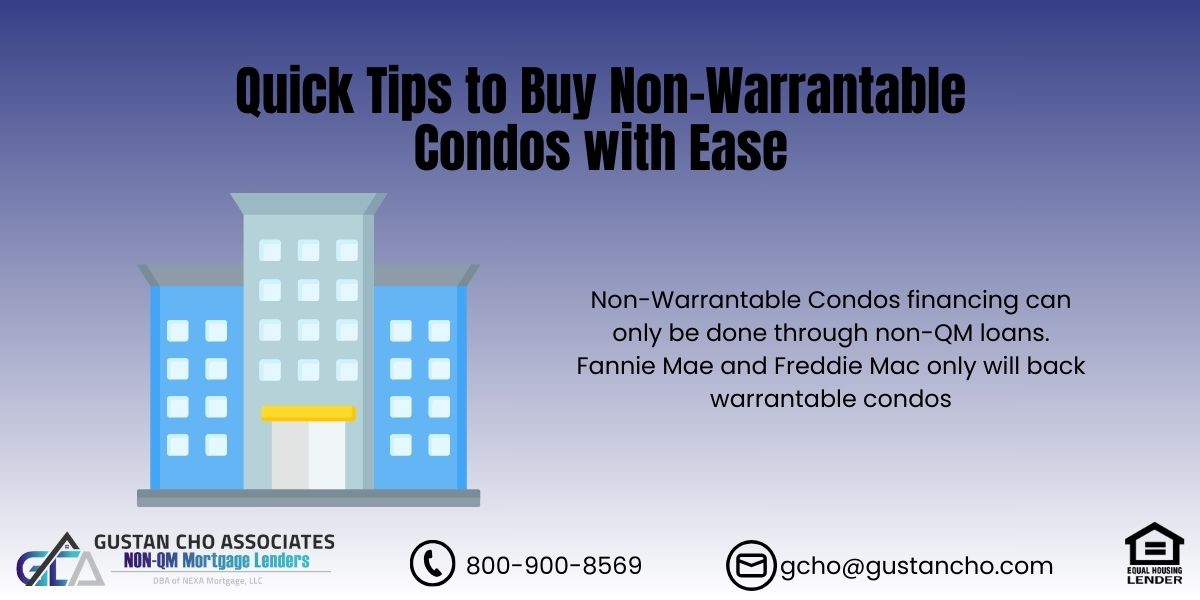Quick Tips to Buy Non-Warrantable Condos with Ease
2024 Guide to Financing Non-Warrantable Condos: Mortgage Options Explained
When buying a condo, it’s important to consider that not all condos offer the same financing options. Some condos are classified as non-warrantable, making getting a mortgage more challenging.
But don’t worry! In this updated guide for 2024, we’ll break down everything you need to know about non-warrantable condos, the mortgage options available, and what it means for you as a borrower. By the end, you’ll feel confident about moving forward with your condo purchase or refinance.
What Are Non-Warrantable Condos?
A non-warrantable condo does not meet the criteria Fannie Mae and Freddie Mac set to qualify for a conventional mortgage. Why does this matter? Fannie Mae and Freddie Mac buy most of the home loans made by banks, but they only touch loans for condos that meet their standards, which makes financing trickier.
Some common reasons a condo might be considered non-warrantable include:
- Less than 50% of the units are owner-occupied (more than half are rented out).
- The condo development is under litigation.
- The condo complex allows short-term rentals, like Airbnb.
- One entity (like an investor) owns more than 10% of the units.
Lenders often perceive condos as riskier properties, which can lead to a higher interest rate or the need for alternative financing options.
Warrantable vs. Non-Warrantable Condos
So, what’s the difference between warrantable and non-warrantable condos?
- Warrantable condos meet all the guidelines set by Fannie Mae and Freddie Mac. These condos are easier to finance through traditional mortgage products.
- Non-warrantable condos, on the other hand, don’t meet these guidelines. As a result, they require non-traditional loans, often through non-QM (non-qualified mortgage) lenders, which are more flexible but may come with higher rates and stricter terms.
For example, in 2024, if you’re buying a non-warrantable condo, you’ll likely need a larger down payment (typically 20% or more) and a higher credit score than if you’re buying a warrantable condo.
Talk To a Loan Officer Click Here
Mortgage Options for Non-Warrantable Condos in 2024

The good news is that even if your dream condo is non-warrantable, you still have mortgage options. Let’s go over them.
1. Non-QM Loans for Non-Warrantable Condos
In 2024, non-QM loans are the most commonly chosen method for funding a non-warrantable condo. These loans are tailored for individuals who do not meet traditional lending criteria. This could be due to the condo’s non-warrantable status or your unique financial situation (like being self-employed or using bank statement loans).
Non-QM lenders are flexible with guidelines, making them a great option for non-warrantable condos. However, they usually come with:
- Higher interest rates compared to conventional loans.
- Larger down payments, typically 20% or more.
- More in-depth scrutiny of your financials.
2. Portfolio Loans
Some financial organizations, such as banks and credit unions, offer portfolio loans. These are loans that the lender keeps in-house rather than selling to Fannie Mae or Freddie Mac. Since these lenders set their own rules, they may be more willing to lend on non-warrantable condos. The rates and terms will differ based on the lender, yet portfolio loans can provide a good option if you prefer to pursue something other than the non-QM path.
3. Private or Hard Money Loans
If you’re an investor or need fast approval, hard money loans are another option. These loans come from private lenders and are often used for short-term financing. Be aware, though, that hard money loans typically come with very high interest rates (sometimes 10% or higher) and short repayment terms. They’re best suited for investment purposes, not long-term homeownership.
Why Are Non-Warrantable Condos Riskier?
From a lender’s perspective, non-warrantable condos carry more risk. Why? Lenders worry that if a large portion of the units are rented out or owned by one entity, the condo complex may not be financially stable. In addition, if the condo development is involved in litigation, that adds another layer of uncertainty.
These factors can lead to:
- Higher interest rates.
- Stricter underwriting guidelines.
- Larger down payment requirements.
How Do I Know If a Condo is Non-Warrantable?
The only way to know for sure is through a condo questionnaire. The condo association must complete this form. This questionnaire provides crucial information about the financial health of the condo complex, its occupancy status, and other details that determine if the condo is warrantable or non-warrantable. Your lender will require this questionnaire before approving the loan.
In 2024, getting this information upfront is more important than ever to avoid any surprises during the mortgage process.
Qualifying for a Non-Warrantable Condo Loan
Here are the key things lenders will look at when you’re applying for a non-warrantable condo mortgage in 2024:
- Credit Score: For non-warrantable condos, a higher credit score is required. While traditional loans may accept scores as low as 620, non-QM loans often require at least a 680.
- Down Payment: For a non-warrantable condo, expect to put down at least 20%, regardless of whether you’re buying as a primary residence, second home, or investment property.
- Debt-to-Income Ratio (DTI): For non-QM loans, it’s typically recommended that your DTI ratio (the percentage of your monthly income used for debt payments) stay under 43%.
- Reserves: Depending on the complexity of the deal, lenders may require you to have 6 to 12 months of reserves (cash or assets that can cover your mortgage payments).
Why Choose a Non-Warrantable Condo?
Non-warrantable condos can be a fantastic opportunity for buyers, especially if you’re looking for:
- Unique properties that cater to vacation rentals or second homes.
- Investment potential in areas with high rental demand.
- Lower prices in markets where other buyers overlook non-warrantable condos.
Although non-warrantable condos are riskier for lenders, they can often offer great deals to buyers who are prepared to meet the stricter financing requirements.
How Non-Warrantable Condos Can Become Warrantable
Here’s the good news: condo complexes are sometimes stuck as non-warrantable forever. In some cases, the condo association can take steps to make the development warrantable, such as:
- Reducing the number of investor-owned units to less than 50%.
- Ensuring the building complies with Fannie Mae and Freddie Mac guidelines.
- Resolving any pending litigation.
If you’re buying a non-warrantable condo to convert it into a warrantable status, keep these improvements in mind and communicate closely with your condo association.
FHA, VA, and USDA Loans for Condos in 2024
It’s worth noting that FHA, VA, and USDA loans have their own set of guidelines for condos. These government-backed loans can offer competitive rates and low down payment options for warrantable condos. However, non-warrantable condos are usually not eligible for FHA, VA, or USDA financing unless they qualify for special programs like FHA’s Spot Loan program.
In 2024, more condo complexes opt out of renewing their HUD certification, which is required for FHA approval. The FHA Spot Loan Program allows individual condos to be eligible for FHA loans, even if the entire complex isn’t HUD-approved.
Key Tips for Buying a Non-Warrantable Condo
Before jumping into buying a non-warrantable condo, keep these tips in mind:
- Work with an experienced lender: Non-QM lenders, like those specializing in non-warrantable condo loans, will be familiar with the nuances of these properties and can help guide you through the process.
- Get the condo questionnaire early: Don’t wait until the last minute to determine if the condo is warrantable. Make sure your lender requests this questionnaire early in the process.
- Be prepared for higher rates: Non-warrantable condos typically come with higher interest rates due to the increased risk, so budget for this in your financial plan.
Should You Refinance Your Non-Warrantable Condo in 2024?
If you already own a non-warrantable condo and are looking to refinance, 2024 brings plenty of opportunities with non-QM lenders. However, refinancing a non-warrantable condo may still have higher rates than conventional loans, so consider your long-term financial goals.
Conclusion: Don’t Let a Non-Warrantable Condo Hold You Back
Purchasing or refinancing a non-warrantable condo in 2024 doesn’t have to be complicated. With the right knowledge and financing options, you can secure your dream condo and even turn it into a smart investment. When considering non-QM loans, portfolio loans, or alternative financing options, it’s important to comprehend your choices and collaborate with the appropriate lender.
Don’t let a condo’s non-warrantable status stand in the way of owning the perfect home. Explore your financing options today and get ready to move forward with confidence!
Apply now to get pre-qualified for your non-warrantable condo loan and take the next step toward homeownership. Call or text us at 800-900-8569 or email us at gcho@gustancho.com.
FAQ’s About Non-Warrantable Condos:
Q: What is a Non-Warrantable Condo?
A: A non-warrantable condo does not conform to the lending standards established by Fannie Mae or Freddie Mac, making it more challenging to secure a conventional mortgage.
Q: Can I still Get a Mortgage for a Non-Warrantable Condo?
A: Yes, you can still get a mortgage for a non-warrantable condo. You’ll likely need a non-QM loan or portfolio loan, which has more flexible terms than conventional loans.
Q: Why are Non-Warrantable Condos Harder to Finance?
A: Lenders view non-warrantable condos as riskier because they might have issues like too many rental units or pending lawsuits, which makes financing more challenging.
Q: What Type of Loan is Best for Buying a Non-Warrantable Condo?
A: Non-QM loans are a popular choice for financing non-warrantable condos. These loans offer flexible guidelines but often come with higher interest rates.
Q: What Down Payment Do I Need for a Non-Warrantable Condo?
A: When buying a non-warrantable condo, typically a 20% minimum down payment is necessary, whether it’sit’s for a primary residence or an investment property.
Q: Are Interest Rates Higher for Non-Warrantable Condos?
A: Yes, interest rates are usually higher for non-warrantable condos due to the extra risk lenders take on with these properties.
Q: Can I Refinance a Non-Warrantable Condo?
A: Yes, you can refine, but you’ll need to go through a non-QM lender, which may still have higher rates than conventional loans.
Q: How Can I Find Out if a Condo is Non-Warrantable?
A: The best way to know is through a condo questionnaire, which your lender will request from the condo association.
Q: Can Non-Warrantable Condos Become Warrantable?
A: Occasionally, a condominium association can implement modifications to align with Fannie Mae and Freddie Mac’s requirements, thereby transforming a non-warrantable condominium into one that meets the criteria for a warrantable property.
Q: Is Buying a Non-Warrantable Condo a Good Investment?
A: Non-warrantable condos can be a great investment, especially in areas with high rental demand. However, be prepared for stricter financing terms and higher costs.
This blog about “Quick Tips to Buy Non-Warrantable Condos with Ease” was updated on October 3rd, 2024.

